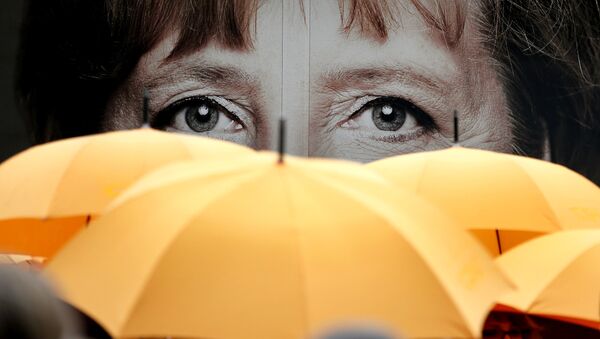There was outrage when in emerged that hundreds of women at Cologne rail station were subjected to a series of sex assaults, molestation, lewd comments and behavior, as well as robbery, during chaotic scenes on New Year's Eve.
— Yvette Cooper (@YvetteCooperMP) January 8, 2016
Mrs Merkel, where are you? Hundreds rally against sexual violence after attacks in #Cologne https://t.co/iZjIor4LpO pic.twitter.com/3XNbEwQLgJ
— Marina Buinovskaya (@MBuinovskaya_RT) January 6, 2016
Merkel said that any refugee handed a jail term — even if it was a suspended sentence — should be kicked out of the country. "If the law does not suffice, then the law must be changed," she said, pledging action to protect not just German citizens, but innocent refugees too, according to AFP.

Currently, refugees are only deported if they have been sentenced to more than three years' imprisonment. However, Merkel told reporters the law could be changed.
"When crimes are committed, and people place themselves outside the law… there must be consequences," Merkel said.
Calls for Merkel's Resignation
The German Interior Ministry announced on Friday that 29 of 32 identified assailants were migrants. The events on New Year's Eve have caused rallies by the anti-Islamic movement Pegida and its rival "Cologne Against Right-Wingers" which were dispersed by police earlier on Saturday.
There have also been calls for Merkel herself to resign in the wake of the incident in Cologne, as well as several other similar incidents in other German towns and cities.
Germany's Justice Minister Heiko Maas told the Bild am Sonntag newspaper:
"No one can tell me that it wasn't coordinated and prepared. My suspicion is that this specific date was picked, and a certain number of people expected. This would again add another dimension [to the crimes]."
Merkel has faced criticism both at home and abroad over the 'open doors' policy on refugees, which saw over a million migrants — mainly from Syria, Afghanistan and Iraq — cross into Germany last year alone. Europe is facing its biggest crisis since the formation of the EU as it struggles to cope with the biggest mass movement of people since the Second World War.
"Cologne has changed everything, people now are doubting," said Volker Bouffier, vice president of Merkel's CDU party.


